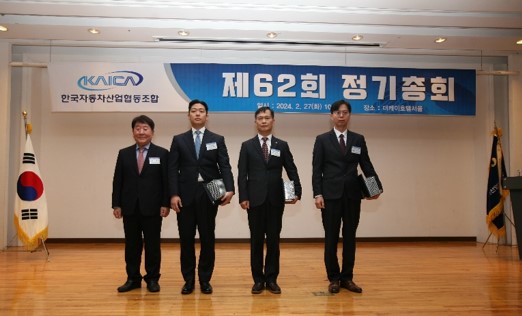Company News
Prize news Seoyon E-Hwa Wins Ministerial Commendation from the Ministry of Trade, Industry, and Energy at the 62nd Korea Auto Industies Coop. Association
Date 24-03-13 15:10
Views 3,335

On February 27, during the 62nd session of the Korea Auto Industries Coop. Association, Executive Vice President and Research Director Lee Yang-ki was honored with a Ministerial Commendation from the Ministry of Trade, Industry, and Energy for his contributions to the advancement of the automotive industry.
Having dedicated himself to the automotive sector since 1990, Executive Vice President Lee Yang-ki has served as the Research Director of Seoyon E-Hwa since January 2020, receiving recognition for his 35 years of contributions to the industry's development. Among his notable achievements, the first to mention is applying a one-step injection molding process for natural materials in automotive door trims. This innovative technology not only reduces the weight of components by more than 35% compared to traditional injection-molded parts but also streamlines the process from four steps to one, significantly enhancing efficiency. Its implementation in Hyundai and Kia's premium models has boosted sales and made substantial contributions to sustainability through the application of eco-friendly technologies and materials.
His second noteworthy contribution is developing a localized heating technology for passengers, which minimizes power consumption while ensuring effective heating for occupants. When applied to various types of vehicles, including electric cars, this technology is expected to reduce the energy required for heating dramatically. Research indicates that, in winter conditions of -7℃, this warmer technology can increase driving range by approximately 8%.
The third key innovation is the development of a high-quality IMG-use PU-PVC fabric aimed at enhancing the luxury of door trims. By replacing the PU synthetic leather wrap with this newly developed fabric, which enables automated wrapping, the technology lowers manufacturing costs, improves productivity, and reduces hazardous substances by cutting down the bonding spray process from two cycles to one. Moreover, the development of eco-friendly plasticizers for PVC, along with additional technologies to reduce odor and volatile organic compounds (VOCs), has simultaneously addressed environmental concerns related to PVC.

